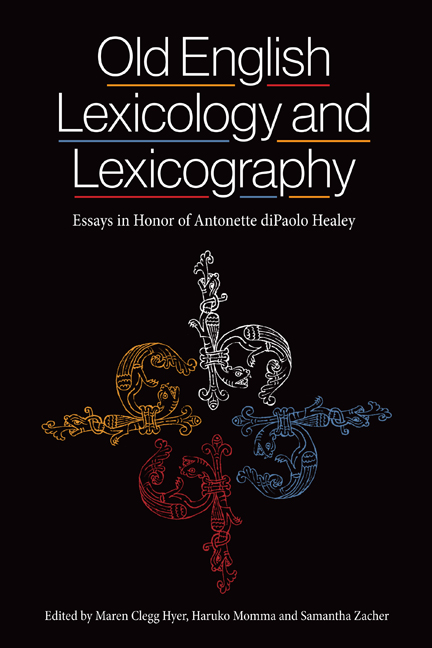Book contents
- Frontmatter
- Dedication
- Contents
- List of Illustrations
- List of Contributors
- Acknowledgements
- Abbreviations
- Introduction
- I Old English Poets and their Word-Craft
- 1 Beowulf and the Art of Invention
- 2 Juliana 53a Revisited (hætsð hæþenweoh)
- 3 Wounds and Compensation in the Old English Soul and Body Poems
- II Old English Homiletic Tradition
- 4 Defining and Redefining: Ælfric's Access to Gregory's Homiliae in Evangelia in the Composition of the Catholic Homilies
- 5 Lambeth Homily 4 and the Textual Tradition of the Visio Pauli
- 6 ‘A Vision of Souls’: Charity, Judgment, and the Utility of the Old English Vision of St. Paul
- 7 The Vocabulary of Sin and the Eight Cardinal Sins
- III Anglo-Saxon Institutions
- 8 The King (and Queen) and ‘I’: Self-Construction in Some Anglo-Saxon Royal Documents
- 9 Anglo-Saxon Maccabees: Political Theology in Ælfric's Lives of Saints
- 10 Nunne in Early Old English: Misogyny in its Literary Context
- IV Lexis of the Quotidian
- 11 Cingulum est custodiam: Semiotics and the Semantic Range of gyrdels
- 12 Island Time: The English Day and the Christian Hours
- 13 ‘Revising Hell’: The Voices of Teachers in Anglo-Saxon Studies and Anglo-Saxon England
- V The Task of the Lexicographer
- 14 Cryptography and the Lexicographer: Codifying the Code
- 15 Genre and the Dictionary of Old English
- Epilogue: Word-Hord
- 16 Reading Beowulf with Isidore's Etymologies
- An Old English Lexicon Dedicated to Toni Healey
- Toni Healey: A Tribute
- List of publications of Antonette diPaolo Healey
- Index
- Tabula Gratulatoria
- Miscellaneous Endmatter
- Anglo-Saxon Studies
15 - Genre and the Dictionary of Old English
Published online by Cambridge University Press: 17 September 2020
- Frontmatter
- Dedication
- Contents
- List of Illustrations
- List of Contributors
- Acknowledgements
- Abbreviations
- Introduction
- I Old English Poets and their Word-Craft
- 1 Beowulf and the Art of Invention
- 2 Juliana 53a Revisited (hætsð hæþenweoh)
- 3 Wounds and Compensation in the Old English Soul and Body Poems
- II Old English Homiletic Tradition
- 4 Defining and Redefining: Ælfric's Access to Gregory's Homiliae in Evangelia in the Composition of the Catholic Homilies
- 5 Lambeth Homily 4 and the Textual Tradition of the Visio Pauli
- 6 ‘A Vision of Souls’: Charity, Judgment, and the Utility of the Old English Vision of St. Paul
- 7 The Vocabulary of Sin and the Eight Cardinal Sins
- III Anglo-Saxon Institutions
- 8 The King (and Queen) and ‘I’: Self-Construction in Some Anglo-Saxon Royal Documents
- 9 Anglo-Saxon Maccabees: Political Theology in Ælfric's Lives of Saints
- 10 Nunne in Early Old English: Misogyny in its Literary Context
- IV Lexis of the Quotidian
- 11 Cingulum est custodiam: Semiotics and the Semantic Range of gyrdels
- 12 Island Time: The English Day and the Christian Hours
- 13 ‘Revising Hell’: The Voices of Teachers in Anglo-Saxon Studies and Anglo-Saxon England
- V The Task of the Lexicographer
- 14 Cryptography and the Lexicographer: Codifying the Code
- 15 Genre and the Dictionary of Old English
- Epilogue: Word-Hord
- 16 Reading Beowulf with Isidore's Etymologies
- An Old English Lexicon Dedicated to Toni Healey
- Toni Healey: A Tribute
- List of publications of Antonette diPaolo Healey
- Index
- Tabula Gratulatoria
- Miscellaneous Endmatter
- Anglo-Saxon Studies
Summary
A lexicographer conducts a symphony, privately and perhaps silently. With every word, the dictionary-maker investigates and balances the semantics against the morphology, the syntax against the historical usages, the spellings and orthographic variants against the cognate languages. For every word, the balance of these elements must be exactly right, and is never exactly the same. One noun might be clarified by comparison with several prefixed versions of the same noun. Another might not. One preposition might have essentially the same usages as in one cognate language, but another might not. The lexicographer has to find her way through a grand and complex score, always ready to cue someone in or to insist on a slower crescendo of references, or a greater dynamic force given to one subset of semantic distinctions rather than another. Great conductors sweat the small stuff and let the big questions solve themselves. So also great lexicographers make sure every detail is checked and double-checked, every comma placed precisely where it disambiguates most helpfully, and every variation of usage elucidated, preferably with a solid contextual quotation from an appropriate text. Antonette diPaolo Healey is a great lexicographer, meticulous, focused, precise, always innovating so that she has the best tools at her disposal and the best modes and methods of publication, deeply learned, and deeply careful of sources, texts, and words. Those sources, texts, and words collect together into genres, and genre is among the many elements balanced by the lexicographer in the complex symphony that is lexicography. In the modern era we enjoy a proliferation of genres from which contextual quotations for dictionary entries can be identified, from tweets to blogs to prose poems to television shows to the Victorian or postmodern novel to rap poetry or spoken word poetry. Dictionaries generally try to balance their presentation of genres in individual entries, so as to demonstrate the generic similarity of usage, or indeed the different usage that a word can have in different genres. Genre, however, also has other implications. In many languages, and therefore dictionaries, genre functions as an index of culture, and one that changes over time.
- Type
- Chapter
- Information
- Old English Lexicology and LexicographyEssays in Honor of Antonette diPaolo Healey, pp. 229 - 242Publisher: Boydell & BrewerPrint publication year: 2020



